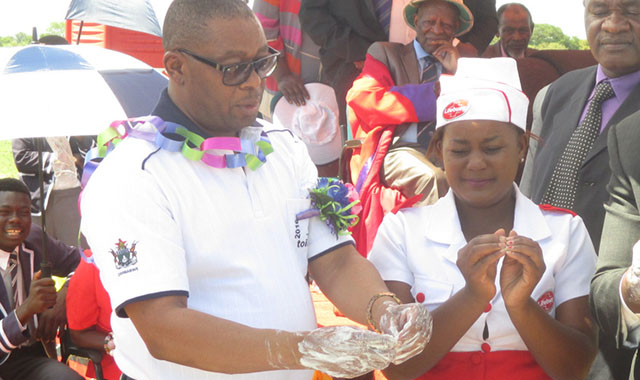Govt invests $53m in rural sanitation


Acting Minister of Health and Child Care Dr Douglas Mombeshora demonstrates the correct way of washing hands during joint National Sanitation Week, Global Hand Washing Day and World Toilet Day commemorations in Mubaira, Mhondoro, yesterday
Walter Nyamukondiwa in MHONDORO
At least 2 000 villages across the country have been declared open defecation- free areas through provision of latrines under Government’s $53 million rural water sanitation and hygiene programme.
About 100 000 latrines have so far been built in five of the country’s provinces where the programme is being implemented.
Speaking at joint National Sanitation Week, Global Hand Washing Day and World Toilet Day commemorations in Mubaira, Vice President Emmerson Mnangagwa, said sanitation and hygiene were key in socio-economic development.
He was represented by Acting Minister of Health and Child Care Dr Douglas Mombeshora, who is also Lands and Rural Resettlement Minister.
“You will recall that the Zim-Asset Mid-Term Review 2015 notes that the water and sanitation situation requires serious attention as most areas lack adequate access to clean and safe drinking water resulting in serious health risks,” said VP Mnanga- gwa.
“I therefore urge all stakeholders to bear in mind that sanitation and hygiene issues are key enablers for the socio-economic development of any nation and that without them, productivity and the quality of life are compromised.”
This year’s commemorations are running under the theme “Latrine Construction and Hand Washing with Soap: Key to Employment Creation”.
The VP said the theme required stakeholders to take advantage of the numerous employment opportunities that would emerge through construction of toilets, sanitation and hygiene infrastruc- ture.
These opportunities, he said, would be particularly available at school and household levels.
While large strides have been made improving access to drinking water, sanitation and hygiene provision has been lagging behind.
VP Mnangagwa implored every school and household in the country to have designated hand washing points using soap and detergents.
“Such an exercise, particularly after contact with excreta, can reduce diarrhoeal diseases and respiratory infections,” he said.
At least 4,5 million people in the country relieve themselves in the open while a staggering 90 percent of the world’s population defecates in the open.
Inadequate sanitation accounts for significant deaths from diarrhoeal diseases, soil transmitted helminthoid infections, trachoma and malnutrition while children are susceptible to opportunistic infections such as pneumonia.
He said Government was committed to the attainment of Sustainable Development Goals for universal access to safe and affordable drinking water and sanitation for all by 2030.
Government, the VP said, was finalising the drafting of the National Sanitation and Hygiene Policy with the support of UNICEF and the Swiss Agency for Development and Cooperation (SDC).
The policy will provide the necessary framework for the sanitation and hygiene sector to meet the SDGs and eradicate most of the WASH-related outbreaks such as cholera, typhoid and dysentery.
In a speech read on his behalf by the Permanent Secretary in the Ministry of Health and Child Care, Dr Gerald Gwinji, Dr David Parirenyatwa said more effort should be made in raising awareness in sanitation and health issues.
Uniliver Zimbabwe managing director Mr Hilary Muzondiwa said public-private prtnerships were key in solving health challenges around water, hygiene and sanitation.
Government is working with UN agencies, DFID, the Australian government and SDC to improve water, sanitation and hygiene in the country.










Comments